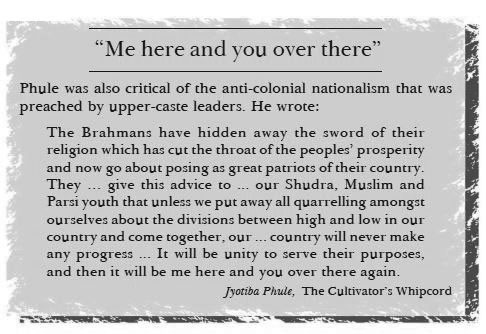Question 1:
Why were Christian missionaries attacked by many people in the country? Would some people have supported them too? If so, for what reasons?
Answer:
The Christian missionaries were attacked by many people because they began setting up schools for tribal groups and lower caste children. These children were thus given some resources to improve their lives. Yes, the Christian missionaries were supported by some educated people because they came to know that there is no place of caste system or other evils in ancient texts. Moreover, it will help them to change their status and position in the society. In fact, they themselves wanted to change the Indian society. That is why they supported Christian missionaries.
Question 2:
In the British period, what new opportunities opened up for people who came from castes that were regarded as “low”?
Answer:
(i) A number of opportunities emerged in the urban areas during the British rule, even for the lower castes. Several job opportunities as well as many municipalities also came up.
(ii) New demand for labour arose due to the expansion of cities.
(iii) For digging drains, constructing roads and cleaning the cities, the services of coolies, carriers, diggers,
bricklayers, sewage cleaners, sweepers, rickshaw pullers and palanquin bearers were required.
(iv) Labour carrying out the above tasks came from the poor sections of villages and small towns
with most of them belonging to the lower castes.
(v) Some of them went to work in plantations of Assam, Mauritius, Trinidad and Indonesia. Although
the work at these new places was very tough, lower caste people considered it as an opportunity
to get away from the oppression of the upper castes.
Question 3:
How did Jyotirao and other reformers justify their criticism of caste inequality in society?
Answer:
Jyotirao Phule was against the ideology of the Brahmans about the superiority of Aryans the over others. Phule was of the view that Aryans were outsiders and after invading India, they started considering the original inhabitants as lower caste people. He urged the natives to rise against caste discrimination and was of the view that the land and power belonged to the original inhabitants and not to the upper castes.
Question 4:
Why did Phule dedicate his book Gulamgiri to the American movement to freeing slaves?
Answer:
Jyotirao Phule wrote a book in 1873 called Gulamgiri which means slavery. He dedicated his book to all those poeple who fought against slavery in the American Civil War that took place in 1861. By doing so, he drew a connection between the sufferings of people due to caste or race in both the countries.
Question 5:
What did Ambedkar want to achieve through the temple entry movement?
Answer:
Between 1927 and 1935, three temple entry movements were started by Dr. B.R. Ambedkar which were supported by people the belonging to the Mahar caste. Due to the caste system, the people belonging to subordinate castes were prohibited to use water from public wells by the Brahman priests. Through these movements, Ambedkar wanted to reveal the true face of caste discrimination to the society.
Question 6:
Why were Jyotirao Phule and Ramaswamy Naicker critical of the national movement? Did their criticism help the national struggle in any way?
Answer:
Both Jyotirao Phule and Ramaswamy Naicker were critical of the national movement because they were of the view that leaders of national movement hardly listened to the plight of the underprivileged sections of the society. Their cause gave momentum to the national movement.
Question 7:
Can you think of the ways in which social customs and practices were discussed in the pre-printing age when books, newspapers and pamphlets were not readily available?
Answer:
Discussions must have held in small groups of people in the pre-printing age before modern forms of communication developed. The ideas would not have circulated among the masses in this manner.
Question 8:
Some people thought this situation was better than the total lack of education for untouchable people. Would you agree with this view?
Answer:
No. If the lower castes or untouchables would be treated as inferior, it is against humanity and the principle of equality of all. Caste discrimination cannot be resolved through such a measure.
Question 9:
Carefully read the Source.
What do you think Jyotirao Phule meant by “me here and you over there again”?
Answer:
In his statement, Phule expresses his view that even if the country remains united and becomes prosperous, the caste and communal differences will not end in the society.
Question 10:
Why does caste remain such a controversial issue today? What do you think was the most important movement against caste in colonial times?
Answer:
Caste remains a controversial issue in the modern times because our society still discriminates on the basis of caste. Caste status is still an integral part of our social system. In the colonial times, the Harijan movement, the Self Respect movement, the Vaikom Satyagraha and the Dalit Buddhist Movement were some important movements against caste.

